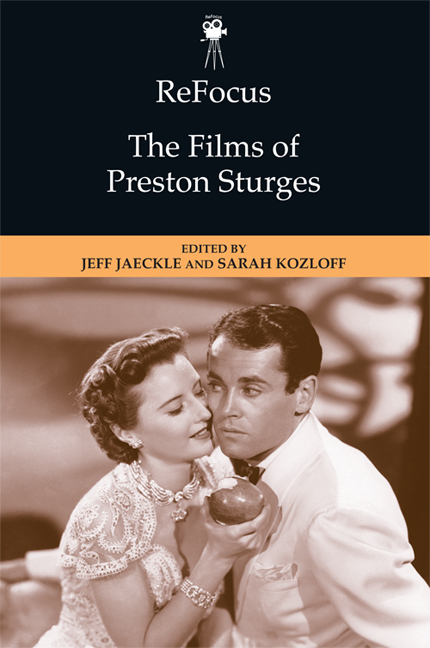Book contents
- Frontmatter
- Contents
- List of Figures
- Notes on Contributors
- Introduction: An Agile Mind—The Many Stands of Preston Sturges
- Part 1 Contexts: Genre, Studio, Authorship
- 1 Preston Sturges and Screwball Comedy
- 2 Preston Sturges, Sullivan's Travels, and Film Authorship in Hollywood, 1941
- 3 To Write and Not Direct
- 4 “The Edge of Unacceptability”: Preston Sturges and the PCA
- Part 2 Cultural Commentary: History and Identity
- Part 3 Technique: Scripting, Performance, Music
- Part 4 Impact: Reception/Reputation
- Index
2 - Preston Sturges, Sullivan's Travels, and Film Authorship in Hollywood, 1941
from Part 1 - Contexts: Genre, Studio, Authorship
Published online by Cambridge University Press: 05 September 2016
- Frontmatter
- Contents
- List of Figures
- Notes on Contributors
- Introduction: An Agile Mind—The Many Stands of Preston Sturges
- Part 1 Contexts: Genre, Studio, Authorship
- 1 Preston Sturges and Screwball Comedy
- 2 Preston Sturges, Sullivan's Travels, and Film Authorship in Hollywood, 1941
- 3 To Write and Not Direct
- 4 “The Edge of Unacceptability”: Preston Sturges and the PCA
- Part 2 Cultural Commentary: History and Identity
- Part 3 Technique: Scripting, Performance, Music
- Part 4 Impact: Reception/Reputation
- Index
Summary
Thanks to the growing influence of the auteur theory, many people today think of directors, even Hollywood directors, as the authors of their films. In the 1930s and 1940s, however, few directors were well known and most were struggling. Audiences of the time commonly viewed movies not in relation to their directors but as products of the studios where they were made or as vehicles for the stars who appeared in them. Even within the studios claims to authorship were challenged as directors vied with screenwriters and others for authority. Preston Sturges's 1941 production Sullivan's Travels, which focuses on a Hollywood director, necessarily confronts this issue and addresses a series of questions. How could a moviemaker working in the American film industry at that time be seen as an author whose art emerged from a passion for aesthetic expression? If a studio movie is made by a group rather than a single individual, how could people understand it as the expression of the inner life of a unique creative genius? And how was it that such a genius became identified with the role of director?
The idea of artists who work together in groups to create art for commercial gain has been a problematic concept at least since the nineteenth century. M. H. Abrams's classic study The Mirror and the Lamp argues that the modern focus on the solitary artist as the source of meaning in an artwork grows out of the idea of the originary genius developed during the Romantic period, when the notion of art as an imitation of nature gave way to an idea of art as the expression of the imaginative vision of its author. Since that time, Western societies have increasingly looked upon works of art as artifacts representing the complex inner lives of unique individuals. Economic gain was supposedly not part of the equation. In addition, the honor traditionally accorded to skill and craftsmanship was largely supplanted by a reverence for inspiration and personal passion. Hollywood movies pose a problem for such an understanding of art. They are made for profit, not from passion.
- Type
- Chapter
- Information
- ReFocus: The Films of Preston Sturges , pp. 46 - 65Publisher: Edinburgh University PressPrint publication year: 2015



